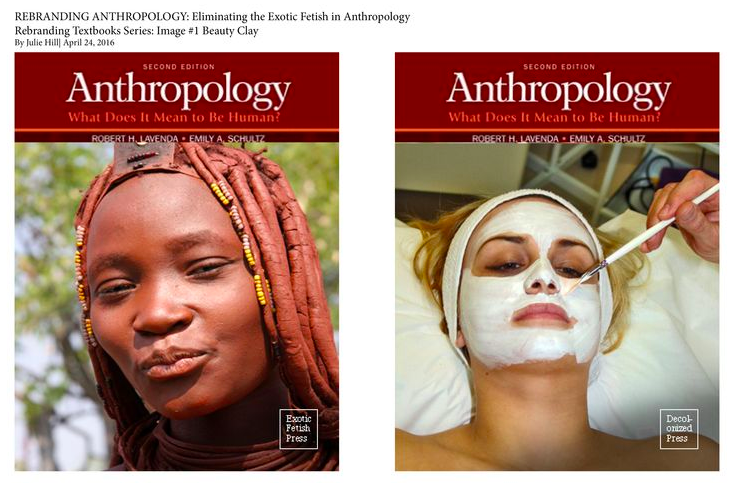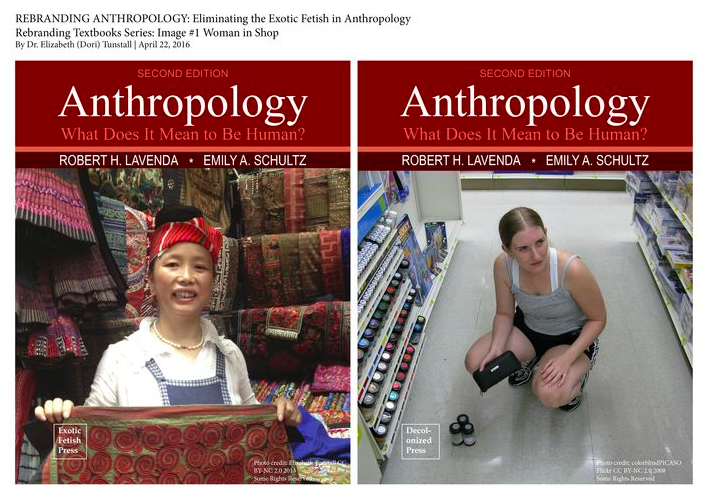Summary:
Guest post by Jeff Mosenkis of Innovations for Poverty Action. Chris found this above, (from a 2016 post) anthropologist Jennifer Esperanza got annoyed at how her field’s textbooks always had exotic cover images, when anthropology is really the study of all humanity. “‘Why can’t there be images of, for example, a group of white American women eating salads, on the cover?,’ she asked.” Dori Tunstall and Julie Hill took up the challenge of putting white people on the covers of anthro textbooks: Rachel Strohm writes movingly and compellingly about her experience with depression in academia. If you’re around grad students, you probably know someone who’s quietly dealing with depression or anxiety, and Rachel explains why academia seems to bring those to the forefront. Also, you probably
Topics:
Jeff Mosenkis (IPA) considers the following as important: academia, anthropology, bank accounts, Books, depression, development, Economics, financial inclusion, gender, miscellany, reading, teaching
This could be interesting, too:
Guest post by Jeff Mosenkis of Innovations for Poverty Action. Chris found this above, (from a 2016 post) anthropologist Jennifer Esperanza got annoyed at how her field’s textbooks always had exotic cover images, when anthropology is really the study of all humanity. “‘Why can’t there be images of, for example, a group of white American women eating salads, on the cover?,’ she asked.” Dori Tunstall and Julie Hill took up the challenge of putting white people on the covers of anthro textbooks: Rachel Strohm writes movingly and compellingly about her experience with depression in academia. If you’re around grad students, you probably know someone who’s quietly dealing with depression or anxiety, and Rachel explains why academia seems to bring those to the forefront. Also, you probably
Topics:
Jeff Mosenkis (IPA) considers the following as important: academia, anthropology, bank accounts, Books, depression, development, Economics, financial inclusion, gender, miscellany, reading, teaching
This could be interesting, too:
Lars Pålsson Syll writes Schuldenbremse bye bye
Lars Pålsson Syll writes What’s wrong with economics — a primer
Lars Pålsson Syll writes Krigskeynesianismens återkomst
Lars Pålsson Syll writes Finding Eigenvalues and Eigenvectors (student stuff)
Guest post by Jeff Mosenkis of Innovations for Poverty Action.

- Chris found this above, (from a 2016 post) anthropologist Jennifer Esperanza got annoyed at how her field’s textbooks always had exotic cover images, when anthropology is really the study of all humanity. “‘Why can’t there be images of, for example, a group of white American women eating salads, on the cover?,’ she asked.” Dori Tunstall and Julie Hill took up the challenge of putting white people on the covers of anthro textbooks:

- Rachel Strohm writes movingly and compellingly about her experience with depression in academia. If you’re around grad students, you probably know someone who’s quietly dealing with depression or anxiety, and Rachel explains why academia seems to bring those to the forefront. Also, you probably know someone outside academia dealing with depression. Actor Wil Wheaton explains what it was like to be an adolescent celebrity trying to hide his chronic depression and anxiety, and how once in his 20’s in the middle of the night he drove to his sister’s house to sleep on her floor, the only thing that had helped when they were kids.
- The great irony of course is that people generally don’t talk about it, so many people go through it alone.
- After years of work expanding access to bank accounts, and discussions of particular outreach to women, a poll of 150,000 people in 144 countries shows the gender gap in bank account ownership is the same seven percentage points as it was in 2011 when the poll first started. In high-income countries the gap is minimal or zero, while in low- and middle-income countries it can be 30 percentage points.
- How does champion reader David Evans retain the information from all the economics, fiction, history, audiobooks, and graphic novels he reads? He takes notes along the way in Evernote, copying the best insights from Amazon’s “look inside” feature, and also writes reviews on his blog to remember the main takeaways.
- Uganda’s education minister rejected a proposed sexual education curriculum as “recruitment grounds for homosexuality and other perversions.” Her proposed replacement will focus on abstinence and faithfulness in marriage. Duflo, Dupas, and Kremer’s 7-year study of neighboring Kenya’s abstinence-focused program found it did not reduce pregnancy or STIs, though the results were a little more complex when it was combined with free school uniforms for girls (effectively reducing their cost of education).
- Greg Rosalsky interviews Harvard’s David Laibson for an article about Econ 101 textbooks. As the field of economics has evolved in recent decades, the most popular textbooks, Samuelson, Mankiw, etc., still essentially teach a largely theoretical classical model, tacking on behavioral and other paradigm shifts as updates at the end of chapters or in callout boxes. This means that the version of econ taught, one based on elegant imaginary lands of universal information, perfectly functioning markets, and selfishness enhancing everybody’s long-run welfare doesn’t reflect how most economists think or practice today. It’s the intellectual equivalent of putting an attractive, but outdated picture on economics’ online dating profile that doesn’t show the field as it really is, which means most policymakers’ understanding of economics is largely fictional.
- Personally though, all of my work rests on Samuelson

- Personally though, all of my work rests on Samuelson
- Also read this thread from Beatrice Cherrier on how Samuelson’s attitudes towards women changed over the course of his career. And Cherrier’s note on his wife, Marion Crawford Samuelson, a gifted mathematical economist who published one paper and retired after having their first child. In her obituary, Paul Samuelson described her work as foundational to the Nobel Prize he received. Be sure to follow Beatrice for more amazing stories on the history of the field.
